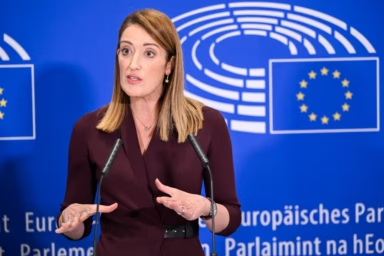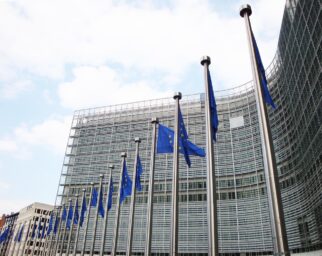Brussels Multiannual Financial Framework for 2028-2034 has the bloc’s parliamentarians up in arms. Critics blast it as a ‘blueprint for chaos‘, with farmers, poorer regions, and Easter member states fearing steep cuts.
A debate of the European Parliament‘s BUDG committee on the EU’s 2028-2034 budget exposed on Tuesday, 23 September sharp divisions over funding priorities. Flexibility mechanisms and fears of diluted democratic oversight were other major sticking points.
Johannes Lindner, co-director of the Jacques Delors Centre, framed the European Commission’s proposal as a “surprisingly ambitious” balancing act between debt repayments and new investments—but warned it remained “politically fragile”. The plan, which allocates 1.26 per cent of EU gross national income (GNI), includes a 0.03 per cent net increase for new priorities after excluding €24bn in annual repayments for pandemic-era NextGenerationEU (NGEU) debt.
Flexibility means trade-offs
“If we strip the NGEU repayments, the increase is minimal—yet member states will treat even this as too much,” Mr Lindner said. He urged lawmakers to defend the proposal’s “structural reforms”, including merging seven budget headings into four and boosting competitiveness spending from 18 per cent to 30 per cent.
Eulalia Rubio of the Jacques Delors Institute dissected risks in the commission’s plan to consolidate 50 per cent of the budget—€700bn in current prices—into national and regional partnership plans. While acknowledging benefits like “synergies between EU and national priorities”, Ms Rubio stressed that “flexibility comes with trade-offs”. She flagged governance gaps, including self-assessed performance milestones—a system borrowed from the Recovery and Resilience Facility (RRF)—and limited parliamentary oversight.
You might be interested
Cohesion and agriculture funding would drop from 62 per cent to 44 per cent of the budget under the plan, with only 10 per cent ring-fenced for specific objectives. “How do we ensure cohesion remains a treaty-mandated priority if it becomes one line in a national plan?” she asked.
Parliament, regions ‘sidelined‘
MEP Siegfried Mureșan (EPP/ROU), a co-rapporteur, spearheaded criticism of the national-plan model, calling it a “blueprint for renationalisation”. He cited the RRF’s opaque governance, where the commission negotiated bilaterally with member states: “If every government cuts bilateral deals, where is the transparency? Where is our role as legislators?” Mr Mureșan questioned compliance with treaty Article 174, which mandates “harmonious development” across regions. “The commission says cohesion is ‘integrated’ into national plans—but without binding allocations, this is just lip service,” he said.
MEP Carla Tavares (S&D/PRT), another co-rapporteur, echoed concerns about centralisation. “Horizon Europe grants flow disproportionately to western Europe’s research hubs. If competitiveness gets 30 per cent of the budget, will it follow the same pattern?” Ms Tavares asked. She warned against sidelining regional authorities, noting that RRF plans paid “empty lip service” to local input. “Mayors submit wishlists, but capitals ignore them. Why repeat this mistake?”
The annual budgetary procedure is the sleeping beauty here; if you can wake it up. — Johannes Lindner, Jacques Delors Centre
MEP Nils Ušakovs (S&D/LAT) predicted a “budgetary drama” for farmers and municipalities, citing proposed cuts to cohesion (from 30 per cent to 22 per cent) and agriculture (32 per cent to 22 per cent). “The commission sells this as flexibility; I call it chaos,” he said.
Flexibility and accountability
The commission’s push for fewer, simpler budget headings drew mixed reactions. Mr Lindner called the shift from seven to four headings “the most radical reform”, arguing it would let the EU “respond faster to crises”. But he admitted oversight gaps, particularly in Heading 2 (competitiveness), where the commission would adopt annual work programmes without parliamentary input. “The annual budgetary procedure is the sleeping beauty here; if you can wake it up,” he told MEPs.
MEP Robert Zīle (ECR/LAT) countered that RRF-style flexibility had “failed its first stress test”, noting only 18 per cent of its €723bn had been spent by mid-2024. “Why replicate a model with unproven results?” he asked.
Citizens will not accept new EU taxes unless they target the wealthy, not their groceries. — MEP Isabel García Muñoz (S&D/ESP)
MEP Fabienne Keller (Renew/FRA) pressed analysts on accountability. “Flexibility sounds good—but how do we ensure funds serve EU goals, not national whims?” she asked. In response, Ms Rubio suggested tightening annual reviews: “If Parliament demands binding amendments during budgetary discharge, it could claw back power.”
Own-resources row
The Commission’s €410bn “own resources” package—designed to cover debt costs—faced cross-party scepticism. Mr Lindner dismissed the proposed corporate tax (CORE) as “dead on arrival in Berlin” and urged alternatives like digital levies. “Tax proposals require unanimity—expect lowest-common-denominator deals that protect net contributors,” he said. MEP Janusz Lewandowski (EPP/POL), a former budget commissioner, blasted the 0.03 per cent net increase as “a joke next to the US Inflation Reduction Act”. “We need €7.3tn for green and digital goals—not crumbs,” he said.
MEP Isabel García Muñoz (S&D/ESP) demanded bolder tax proposals, including financial-transaction levies. “Citizens will not accept new EU taxes unless they target the wealthy, not their groceries,” she said. Others accused the commission of “double standards”, noting eastern farmers receive less per hectare under CAP than western peers. “Merging funds without parity locks in discrimination,” the chamber heard.
The commission’s proposal to let the EU borrow up to €75bn for crisis responses split the room. Mr Lindner called it a “necessary evil” to avoid messy Article 122 negotiations during emergencies. “We can’t improvise loans every time a crisis hits,” he said. But MEP Niklas Nienaß (Greens-EFA/DEU) warned it would normalise “toxic debt-for-reform deals”, citing Greek austerity programmes.
Eastern vs western priorities
Defence funding drew withering critiques. “The commission offers €5bn annually for EU defence initiatives while member states spend €270bn nationally. This isn’t strategy, it’s decoration,” said Mr Lewandowski.
Fight to improve the commission’s plan, don’t reject it outright. A smaller budget means deeper cuts to everything. — Johannes Lindner
His party colleague Radan Kanev (EPP/BLG) noted Horizon Europe’s military research grants favour western arms firms: “Without quotas, eastern Europe’s defence industry will wither.”
Central and eastern European delegations revolted against perceived favouritism. “Eighty-three per cent of Horizon Europe grants go to Germany, France and the Netherlands. If competitiveness replaces cohesion, this gap will explode,” Mr Kanev said. László Trócsányi (EPP/HUN) accused the commission of “punishing” eastern members through RRF rule-of-law conditions: “First you freeze funds, then you lecture us about democracy.”
Path ahead
Ms Rubio pushed back, arguing cohesion policy needed modernisation. “The 2026 cohesion report shows intra-regional inequality now exceeds cross-border gaps. Portugal’s rural interior needs different tools than Lisbon’s suburbs,” she said. Mr Lindner agreed but urged pragmatism: “Fight to improve the commission’s plan—don’t reject it outright. A smaller budget means deeper cuts to everything.”
With the commission needing an absolute majority in Parliament to pass the MFF, analysts expect gruelling talks. Mr Mureșan vowed to “fight for binding cohesion percentages and clearer scrutiny tools”. Ms Tavares pledged to rally regional leaders against “backroom deals”. But Mr Lindner cautioned against overreach: “If you demand too much, member states will walk away—then we get a bare-bones budget.”











